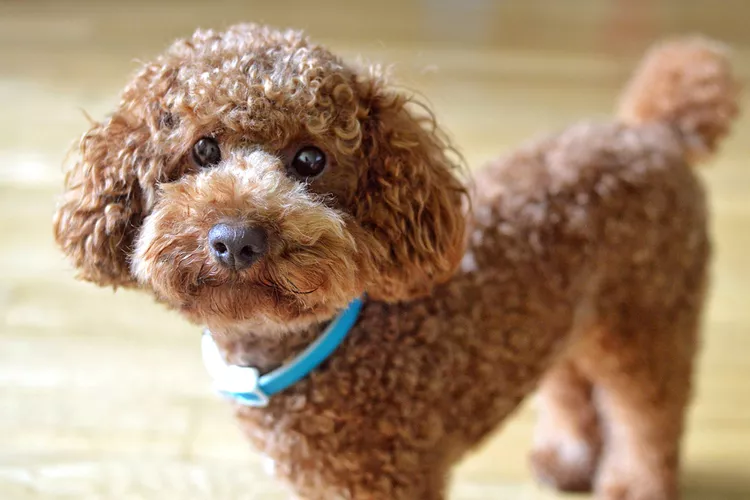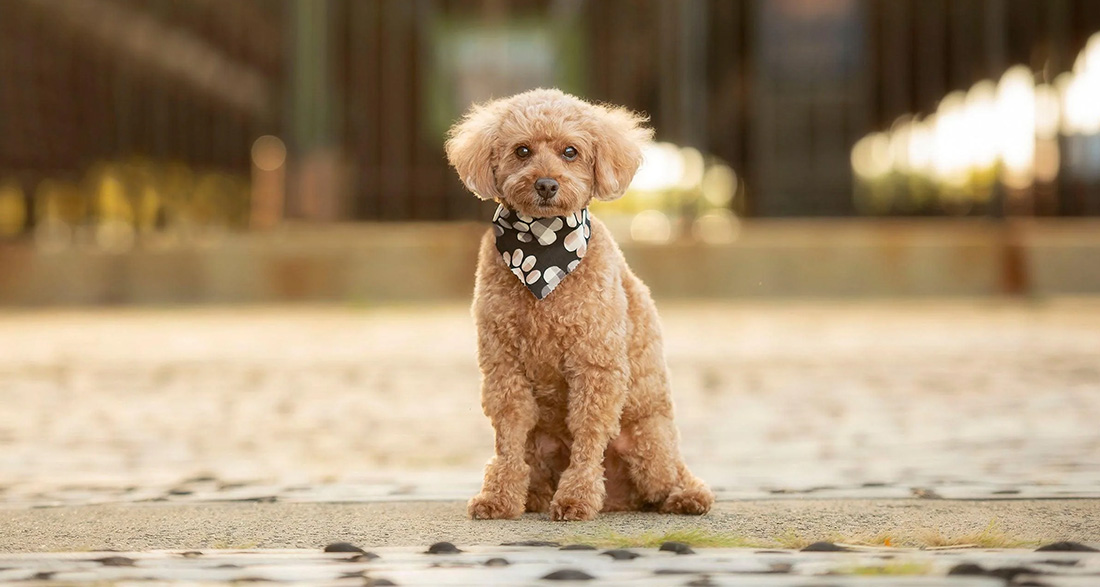The Miniature Poodle isn’t your stereotypical grandma’s dog but a sporty pup with real circus potential! With its playful nature, this French breed feels particularly at home in families with children.
History of the Miniature Poodle
The origins of the Miniature Poodle aren’t fully documented from the beginning. However, it’s presumed to have descended from French water dogs (Barbets), originating within French territory.
Both the Barbets and the Poodles share a common hunting history. They have a passion for swimming and retrieving. Due to its love for water, the Poodle assisted in hunting waterfowl, such as ducks or pheasants.
Although the Poodle dates back to ancient Greece, it proved to be particularly beneficial during water activities. This distinctive haircut resulted in an effective combination of protection (due to the dense curls) and high swimming speed (due to the shave).
According to written records, Poodle-like dogs have been documented since at least the 14th century. By the 17th century, French water hunters had gained popularity throughout Europe. However, they were mainly kept in noble courts, where they gradually transformed from hunting assistants to companion dogs.
In the 20th century, breeding took on a whole new dimension. Poodles were now bred to a standard and selected for size. Miniature Poodles appeared in 1936. Prior to that, there were only Toy and Standard Poodles, which were significantly larger and heavier than the miniature form.
Breed Overview
GROUP: Non-Sporting
HEIGHT: 10 to 15 inches
WEIGHT: 10 to 15 pounds
COAT: curly, long, medium, short
COAT COLOR: black, blue, brown / chocolate / liver, cream, fawn, gold / yellow, gray, red, white
LIFE SPAN: 10 to 18 years
TEMPERAMENT: anxious, friendly, playful, timid
HYPOALLERGENIC: Yes
ORIGIN: France
Nature and Character
There are several stereotypes surrounding the Miniature Poodle, some of which are either completely untrue or only partially true. For example, the idea that Miniature Poodles are spoiled divas is often associated with their appearance after grooming. However, the reality is different: these small French dogs don’t have any airs. Instead, they are affectionate, cheerful, and playful.
Another misconception is that Miniature Poodles are best suited for senior households. This is partly true. Miniature Poodles are adaptable and get along well with both older and younger dog owners.
Miniature Poodles generally have high social skills, which means they get along well with children and other dogs. Their ability to remain calm is particularly advantageous when interacting with children. Even the everyday hustle and bustle typical of families with children doesn’t faze them.
Moreover, these small four-legged companions prefer to stay close to their caregivers while remaining aloof towards strangers.
But why are Poodles so affectionate? Since the 18th century, Poodles have been companion dogs, which means they have been integral members of the family for centuries. Compared to larger Poodle varieties, the Miniature Poodle is relatively lively.
By the way, what’s the difference between a Miniature Poodle and a Toy Poodle? The FCI recognizes the Poodle in four sizes (Toy, Miniature, Standard, and Giant Poodle). The Miniature Poodle grows up to 35 cm tall, while the Toy Poodle reaches a withers height of 45 cm.
The Miniature Poodle has a lively core. With adequate stimulation, it’s still a typical apartment dog. Especially in apartment buildings, you must also consider the needs (such as the need for quiet) of your neighbors.
Is the Miniature Poodle a Barker?
The Miniature Poodle is not a barker, but it does like to communicate nonetheless. Additionally, it alerts its family to intruders by barking.
This leads to the following question: Are Miniature Poodles nervous? Some level of nervousness is normal for the attentive Miniature Poodle. However, it is generally calm.
| Affection Level | High |
| Friendliness | High |
| Kid-Friendly | High |
| Pet-Friendly | Medium |
| Exercise Needs | High |
| Playfulness | High |
| Energy Level | High |
| Trainability | High |
| Intelligence | High |
| Tendency to Bark | High |
| Amount of Shedding | Low |
Acquiring a Miniature Poodle
How much does a genuine Miniature Poodle cost? Prices for a Miniature Poodle from a breeder start at around $1,300. Depending on the color or pedigree, they may be several hundred euros more expensive. Generally, you should not have to pay more than $2,000. However, you can also turn to animal shelters if older animals or second-hand dogs are suitable for you.

What should I look for when buying?
While the purchase price determines whether and when you can acquire a Miniature Poodle, there are other purchasing criteria that are equally important:
- The breeder should be affiliated with the AKC and/or one of the American Poodle associations.
- A good breeder is characterized, among other things, by having experience with dogs and being willing to provide information about the puppies.
- Trustworthy sellers offer meetings for bonding between the dog and the owner.
- Additionally, reputable breeders are known for their tremendous helpfulness, which should continue even after the puppy has left.
- It is important that there are no duplicate entries in the pedigree documents (indicating inbreeding).
- Make sure that the breeder integrates the Miniature Poodle puppies into their daily lives and family life. Contact with unfamiliar dogs/children/cats would be ideal.
- Find out if the puppies have already had basic training and are familiar with various environmental stimuli.
- Furthermore, you can recognize a good seller by their ability to provide health examinations and age-appropriate protective measures (such as deworming and vaccinations).
- Reputable breeders only use dogs with certain character traits in breeding. This is to ensure that the Miniature Poodle puppy can be trained for the intended purpose (such as a family or therapy dog).
Development and Training of the Puppy
Is the Miniature Poodle a beginner dog? The Miniature Poodle is a beginner-friendly dog with a high willingness to learn. Additionally, it has a “will-to-please,” meaning it strives to please its owner. Although the Miniature Poodle is easily trainable, it, like all other dogs, needs consistent guidance from the start. Expect setbacks in training, especially during adolescence.
How to Care for a Miniature Poodle?
Many dog owners desire a cuddly family companion to spend their evenings with on the couch. Perhaps you’re considering adopting a Miniature Poodle and wondering: Is the Poodle affectionate? The answer is a resounding “Yes!” The Miniature Poodle loves cuddles and undivided attention.
Overall, the Miniature Poodle is a loyal family friend who, with proper training, is lovable, friendly, and compatible. Due to its special coat, the Miniature Poodle is also highly popular among allergy sufferers and exhibitors. Another advantage is its high adaptability. This means it can also thrive in an urban environment. Due to its compact size, the Miniature Poodle is well-suited for apartment living, but this doesn’t mean it doesn’t need enrichment activities.
But, how much exercise does a Miniature Poodle need? The Miniature Poodle is an active dog that requires a mix of physical and mental stimulation to be happy. If you keep your Miniature Poodle indoors, it’s especially important to provide appropriate activities.
Activities with the Miniature Poodle
On one hand, the Miniature Poodle is a people-oriented dog who enjoys being petted and pampered. On the other hand, it is also a sports enthusiast with a high need for movement. Walks with access to water (such as rivers and lakes) are great daily activities since the Miniature Poodle enjoys water activities.
But what distance is ideal for the small pooch? Or, in other words, how long should you walk a Miniature Poodle? A walk of 30 to 60 minutes should be sufficient three times a day. However, it’s also good to occasionally make it more challenging. The Miniature Poodle is ideal for complex tasks and dog sports. Additionally, it’s a dog that also needs mental stimulation (such as with intelligence toys).

Health and Grooming
The Miniature Poodle is considered low-maintenance because it doesn’t have an undercoat. This means it sheds minimal fur even during seasonal changes.
Note: The Miniature Poodle is a so-called hypoallergenic dog.
However, the fact that the little French dog sheds little fur doesn’t mean it doesn’t need grooming. Just like with other breeds, regular brushing is a must. Furthermore, the coat of the Miniature Poodle continuously grows. Therefore, it’s important for the four-legged friend to get a professional trim every two to three months.
Tip: If you learn how to properly groom your Miniature Poodle and invest in a good clipper, you can take on this task yourself.
There are no breed-specific dietary requirements for the Miniature Poodle. Although the Miniature Poodle can be described as robust with a lifespan of up to 16 years, it shows increased susceptibility to the following diseases:
- Skin problems
- Eye diseases
- Joint issues in the knee
- Epilepsy
Interesting and Fun Facts
Finally, here are two fun facts that will surprise you:
- Poodles and Miniature Poodles were – and still are – used as circus dogs.
- However, Poodles, let alone the Miniature variety, have not been used in hunting for a long time.


